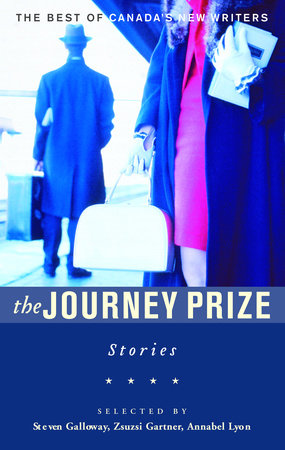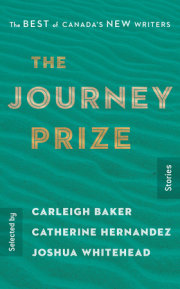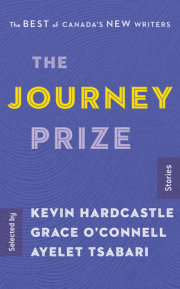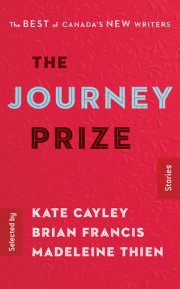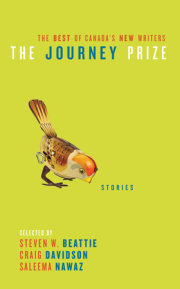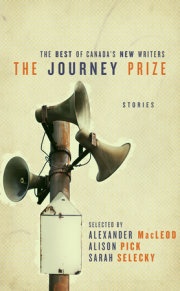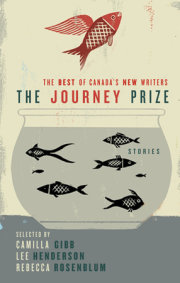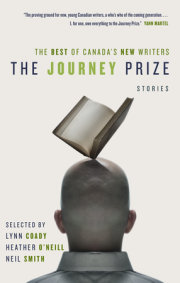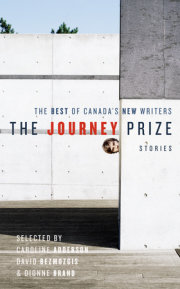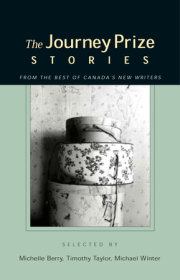Discover the intriguing and diverse voices of Canada's new literary writers in this popular and nationally acclaimed annual anthology
"There's nothing else like it in Canada. . . . The Journey Prize anthology has become the proving ground for new, young Canadian writers, a who's who of the coming generation. . . . I, for one, owe everything to the Journey Prize." - Yann Martel, author of Life of Pi
The $10,000 Journey Prize, now known as The Writers' Trust of Canada/McClelland & Stewart Journey Prize, is awarded annually to a new and developing writer of distinction for a short story published in a Canadian literary publication. This award is made possible by James A. Michener's generous donation of his Canadian royalties earnings from his novel Journey, published by McClelland & Stewart in 1988. The Journey Prize itself is the most significant monetary award given in Canada to a writer at the beginning of his or her career for a short story or excerpt from a fiction work-in-progress.
The winner of the Journey Prize is selected from among the stories that appear in the current volume of The Journey Prize Stories, published annually in the fall by McClelland & Stewart.
For over a decade The Journey Prize Stories has established itself as one of the most prestigious anthologies in the country, introducing readers to the best new Canadian writers from coast to coast. It has become a who's who of up-and-coming writers, and many of the authors whose early work has appeared in the anthology have gone on to distinguish themselves with acclaimed collections of stories or novels, and have won many of Canada's most prestigious literary awards, including the Governor General's Award, the Trillium Award, the Chapters/Books in Canada First Novel Award, and The Giller Prize.
The anthology sets itself apart from others in that it comprises a selection of stories that editors of literary publications from across the country have chosen as what, in their view, is the most exciting writing in English that they have published in the previous year. In recognition of the vital role literary publications play in discovering and promoting new writers, McClelland & Stewart gives its own award of $2,000 to the literary publication that originally published and submitted the winning entry.
McClelland & Stewart acknowledges the continuing enthusiastic support of writers, literary publication editors, and the public in the common celebration of the emergence of new voices in Canadian fiction.
In this anthology:
Heather Birrell, “BriannaSusannaAlana” (The New Quarterly) (Winner)
Craig Boyko, “The Baby” (from Descant)
Craig Boyko, “The Beloved Departed” (Grain Magazine)
Nadia Bozak, “Heavy Metal Housekeeping” (subTerrain Magazine)
Lee Henderson, “Conjugation” (Border Crossings)
Melanie Little, “Wrestling” (PRISM international)
Matthew Rader, “The Lonesome Death of Joseph Fey” (Grain Magazine)
Scott Randall, “Law School” (The Dalhousie Review)
Sarah Selecky, “Throwing Cotton” (Prairie Fire)
Damian Tarnopolsky, “Sleepy” (Exile)
Martin West, “Cretacea” (PRISM international)
David Whitton, “The Eclipse” (Taddle Creek)
Clea Young, “Split” (The Malahat Review)
"There's nothing else like it in Canada. . . . The Journey Prize anthology has become the proving ground for new, young Canadian writers, a who's who of the coming generation. . . . I, for one, owe everything to the Journey Prize." - Yann Martel, author of Life of Pi
The $10,000 Journey Prize, now known as The Writers' Trust of Canada/McClelland & Stewart Journey Prize, is awarded annually to a new and developing writer of distinction for a short story published in a Canadian literary publication. This award is made possible by James A. Michener's generous donation of his Canadian royalties earnings from his novel Journey, published by McClelland & Stewart in 1988. The Journey Prize itself is the most significant monetary award given in Canada to a writer at the beginning of his or her career for a short story or excerpt from a fiction work-in-progress.
The winner of the Journey Prize is selected from among the stories that appear in the current volume of The Journey Prize Stories, published annually in the fall by McClelland & Stewart.
For over a decade The Journey Prize Stories has established itself as one of the most prestigious anthologies in the country, introducing readers to the best new Canadian writers from coast to coast. It has become a who's who of up-and-coming writers, and many of the authors whose early work has appeared in the anthology have gone on to distinguish themselves with acclaimed collections of stories or novels, and have won many of Canada's most prestigious literary awards, including the Governor General's Award, the Trillium Award, the Chapters/Books in Canada First Novel Award, and The Giller Prize.
The anthology sets itself apart from others in that it comprises a selection of stories that editors of literary publications from across the country have chosen as what, in their view, is the most exciting writing in English that they have published in the previous year. In recognition of the vital role literary publications play in discovering and promoting new writers, McClelland & Stewart gives its own award of $2,000 to the literary publication that originally published and submitted the winning entry.
McClelland & Stewart acknowledges the continuing enthusiastic support of writers, literary publication editors, and the public in the common celebration of the emergence of new voices in Canadian fiction.
In this anthology:
Heather Birrell, “BriannaSusannaAlana” (The New Quarterly) (Winner)
Craig Boyko, “The Baby” (from Descant)
Craig Boyko, “The Beloved Departed” (Grain Magazine)
Nadia Bozak, “Heavy Metal Housekeeping” (subTerrain Magazine)
Lee Henderson, “Conjugation” (Border Crossings)
Melanie Little, “Wrestling” (PRISM international)
Matthew Rader, “The Lonesome Death of Joseph Fey” (Grain Magazine)
Scott Randall, “Law School” (The Dalhousie Review)
Sarah Selecky, “Throwing Cotton” (Prairie Fire)
Damian Tarnopolsky, “Sleepy” (Exile)
Martin West, “Cretacea” (PRISM international)
David Whitton, “The Eclipse” (Taddle Creek)
Clea Young, “Split” (The Malahat Review)
“Tomorrow’s shortlists for the Giller and the Governor General’s prizes invariably start with today’s Journey Prize Stories.”
— Globe and Mail
“The Journey Prize anthology has become the proving ground for new, young Canadian writers, a who’s who of the coming generation. . . . There’s nothing else like it in Canada. . . . I, for one, owe everything to the Journey Prize.”
— Yann Martel, previous Journey Prize winner and the author of the Booker Prize-winning novel Life of Pi
— Globe and Mail
“The Journey Prize anthology has become the proving ground for new, young Canadian writers, a who’s who of the coming generation. . . . There’s nothing else like it in Canada. . . . I, for one, owe everything to the Journey Prize.”
— Yann Martel, previous Journey Prize winner and the author of the Booker Prize-winning novel Life of Pi
Introduction
There’s always a whiff of mystery, and perhaps even duplicity, to the work of literary juries — at least when viewed from without. All three of us have been there: the writer, nose pressed to the wrong side of the looking glass, marvelling at the machinations of those charged with judging our work against that of our peers. So we could lay down a bunch of jive here about the almost sinister alchemy that transpires when three headstrong lovers (and writers) of fiction meet to thrust and parry over which handful of stories, out of a dizzying seventy-five submitted to the Journey Prize this year (read blind, of course), ultimately deserve the limelight.
We could tell you there was blood on the floor.
We could tell you what we were looking for, checklist firmly in hand: Stories with sentences that flaunt and swagger, that seesaw and flirt, sentences you just might want to curl up inside of for a week; stories savage with wit and wisdom; stories that startle; stories that know when to hold ’em, know when to fold ’em; stories with complex emotional undertow, that have that requisite “X” factor — compelling the emotions as well as the mind. Although, to be honest, we didn’t know what we were looking for until we actually stumbled across it — but shhhh.
We could wax academical about themes. Why so many stories about babies, or fear of babies? About death and near-death? And why are the guys in these stories so weird, the small fry so preternaturally intelligent, the women so bloody-minded? Is it just us? The state of CanLit? Something in the non-medicated, organic beef jerky?
We could. But why try to connect the dots? As American writer Jayne Anne Phillips once wrote, “Any piece of fiction that really works is a perfect example of itself.” In other words, all the best stories are sui generis — they have no evil twins. Any confluence of theme here is accidental; we were seduced by particulars rather than universals.
So why not let the stories speak for themselves?
There’s Lee Henderson’s “Conjunctions,” a “Metamorphosis” for the twenty-first century: “As I awoke one morning from uneasy dreams I found myself back in grade four.” Hard to resist a story in which a grown man finds redemption while wreaking havoc in the carefully constructed schoolyard pecking order of a bunch of ten-year-olds.
Equally at ease with their own slant logic are Craig Boyko’s two stories: “The Baby,” a clever work that is as much a paean to the power of storytelling as to fatherhood, and “Beloved Departed,” a tour-de-force recasting of the Orpheus myth.
Clea Young’s “Split” is spring-loaded with tension, its sentences taut enough to hold a tightrope walker, as two old friends — one a new mother, the other hugely ambivalent about babies — talk about sex (“The organic track of Jed’s tongue like snail-glue over her body was enough.”) and who they used to be.
With “Cretacea,” Martin West has created a fully three-dimensional world for his acerbic, politically jaded, historically savvy Luddite of a narrator to ride shotgun over. The smartest political satire ever set in the Alberta Badlands.
The world’s tallest free-standing structure hovers like a sentinel in the distance over Heather Birrell’s “BriannaSusannaAlana,” through which bright urgency surges like an electrical charge as three sisters try to reconstruct what they were up to the day a murder was discovered in their neighbourhood.
And just when you thought the second-person singular had outlived its rather short-lived welcome, along comes Nadia Bozak’s “Heavy Metal Housekeeping,” a wrenching ode to the travails of motherhood and to the surprisingly delicate T-shirts worn by concave-chested acolytes of Metallica, Anthrax, and Megadeth.
That’s just some of them — thirteen stories in all (we’re not superstitious). And no blood on the floor.
There’s always a whiff of mystery, and perhaps even duplicity, to the work of literary juries — at least when viewed from without. All three of us have been there: the writer, nose pressed to the wrong side of the looking glass, marvelling at the machinations of those charged with judging our work against that of our peers. So we could lay down a bunch of jive here about the almost sinister alchemy that transpires when three headstrong lovers (and writers) of fiction meet to thrust and parry over which handful of stories, out of a dizzying seventy-five submitted to the Journey Prize this year (read blind, of course), ultimately deserve the limelight.
We could tell you there was blood on the floor.
We could tell you what we were looking for, checklist firmly in hand: Stories with sentences that flaunt and swagger, that seesaw and flirt, sentences you just might want to curl up inside of for a week; stories savage with wit and wisdom; stories that startle; stories that know when to hold ’em, know when to fold ’em; stories with complex emotional undertow, that have that requisite “X” factor — compelling the emotions as well as the mind. Although, to be honest, we didn’t know what we were looking for until we actually stumbled across it — but shhhh.
We could wax academical about themes. Why so many stories about babies, or fear of babies? About death and near-death? And why are the guys in these stories so weird, the small fry so preternaturally intelligent, the women so bloody-minded? Is it just us? The state of CanLit? Something in the non-medicated, organic beef jerky?
We could. But why try to connect the dots? As American writer Jayne Anne Phillips once wrote, “Any piece of fiction that really works is a perfect example of itself.” In other words, all the best stories are sui generis — they have no evil twins. Any confluence of theme here is accidental; we were seduced by particulars rather than universals.
So why not let the stories speak for themselves?
There’s Lee Henderson’s “Conjunctions,” a “Metamorphosis” for the twenty-first century: “As I awoke one morning from uneasy dreams I found myself back in grade four.” Hard to resist a story in which a grown man finds redemption while wreaking havoc in the carefully constructed schoolyard pecking order of a bunch of ten-year-olds.
Equally at ease with their own slant logic are Craig Boyko’s two stories: “The Baby,” a clever work that is as much a paean to the power of storytelling as to fatherhood, and “Beloved Departed,” a tour-de-force recasting of the Orpheus myth.
Clea Young’s “Split” is spring-loaded with tension, its sentences taut enough to hold a tightrope walker, as two old friends — one a new mother, the other hugely ambivalent about babies — talk about sex (“The organic track of Jed’s tongue like snail-glue over her body was enough.”) and who they used to be.
With “Cretacea,” Martin West has created a fully three-dimensional world for his acerbic, politically jaded, historically savvy Luddite of a narrator to ride shotgun over. The smartest political satire ever set in the Alberta Badlands.
The world’s tallest free-standing structure hovers like a sentinel in the distance over Heather Birrell’s “BriannaSusannaAlana,” through which bright urgency surges like an electrical charge as three sisters try to reconstruct what they were up to the day a murder was discovered in their neighbourhood.
And just when you thought the second-person singular had outlived its rather short-lived welcome, along comes Nadia Bozak’s “Heavy Metal Housekeeping,” a wrenching ode to the travails of motherhood and to the surprisingly delicate T-shirts worn by concave-chested acolytes of Metallica, Anthrax, and Megadeth.
That’s just some of them — thirteen stories in all (we’re not superstitious). And no blood on the floor.
Copyright © 2006 by Selected by Steven Galloway, Zsuzsi Gartner, and Annabel Lyon. All rights reserved. No part of this excerpt may be reproduced or reprinted without permission in writing from the publisher.
About
Discover the intriguing and diverse voices of Canada's new literary writers in this popular and nationally acclaimed annual anthology
"There's nothing else like it in Canada. . . . The Journey Prize anthology has become the proving ground for new, young Canadian writers, a who's who of the coming generation. . . . I, for one, owe everything to the Journey Prize." - Yann Martel, author of Life of Pi
The $10,000 Journey Prize, now known as The Writers' Trust of Canada/McClelland & Stewart Journey Prize, is awarded annually to a new and developing writer of distinction for a short story published in a Canadian literary publication. This award is made possible by James A. Michener's generous donation of his Canadian royalties earnings from his novel Journey, published by McClelland & Stewart in 1988. The Journey Prize itself is the most significant monetary award given in Canada to a writer at the beginning of his or her career for a short story or excerpt from a fiction work-in-progress.
The winner of the Journey Prize is selected from among the stories that appear in the current volume of The Journey Prize Stories, published annually in the fall by McClelland & Stewart.
For over a decade The Journey Prize Stories has established itself as one of the most prestigious anthologies in the country, introducing readers to the best new Canadian writers from coast to coast. It has become a who's who of up-and-coming writers, and many of the authors whose early work has appeared in the anthology have gone on to distinguish themselves with acclaimed collections of stories or novels, and have won many of Canada's most prestigious literary awards, including the Governor General's Award, the Trillium Award, the Chapters/Books in Canada First Novel Award, and The Giller Prize.
The anthology sets itself apart from others in that it comprises a selection of stories that editors of literary publications from across the country have chosen as what, in their view, is the most exciting writing in English that they have published in the previous year. In recognition of the vital role literary publications play in discovering and promoting new writers, McClelland & Stewart gives its own award of $2,000 to the literary publication that originally published and submitted the winning entry.
McClelland & Stewart acknowledges the continuing enthusiastic support of writers, literary publication editors, and the public in the common celebration of the emergence of new voices in Canadian fiction.
In this anthology:
Heather Birrell, “BriannaSusannaAlana” (The New Quarterly) (Winner)
Craig Boyko, “The Baby” (from Descant)
Craig Boyko, “The Beloved Departed” (Grain Magazine)
Nadia Bozak, “Heavy Metal Housekeeping” (subTerrain Magazine)
Lee Henderson, “Conjugation” (Border Crossings)
Melanie Little, “Wrestling” (PRISM international)
Matthew Rader, “The Lonesome Death of Joseph Fey” (Grain Magazine)
Scott Randall, “Law School” (The Dalhousie Review)
Sarah Selecky, “Throwing Cotton” (Prairie Fire)
Damian Tarnopolsky, “Sleepy” (Exile)
Martin West, “Cretacea” (PRISM international)
David Whitton, “The Eclipse” (Taddle Creek)
Clea Young, “Split” (The Malahat Review)
"There's nothing else like it in Canada. . . . The Journey Prize anthology has become the proving ground for new, young Canadian writers, a who's who of the coming generation. . . . I, for one, owe everything to the Journey Prize." - Yann Martel, author of Life of Pi
The $10,000 Journey Prize, now known as The Writers' Trust of Canada/McClelland & Stewart Journey Prize, is awarded annually to a new and developing writer of distinction for a short story published in a Canadian literary publication. This award is made possible by James A. Michener's generous donation of his Canadian royalties earnings from his novel Journey, published by McClelland & Stewart in 1988. The Journey Prize itself is the most significant monetary award given in Canada to a writer at the beginning of his or her career for a short story or excerpt from a fiction work-in-progress.
The winner of the Journey Prize is selected from among the stories that appear in the current volume of The Journey Prize Stories, published annually in the fall by McClelland & Stewart.
For over a decade The Journey Prize Stories has established itself as one of the most prestigious anthologies in the country, introducing readers to the best new Canadian writers from coast to coast. It has become a who's who of up-and-coming writers, and many of the authors whose early work has appeared in the anthology have gone on to distinguish themselves with acclaimed collections of stories or novels, and have won many of Canada's most prestigious literary awards, including the Governor General's Award, the Trillium Award, the Chapters/Books in Canada First Novel Award, and The Giller Prize.
The anthology sets itself apart from others in that it comprises a selection of stories that editors of literary publications from across the country have chosen as what, in their view, is the most exciting writing in English that they have published in the previous year. In recognition of the vital role literary publications play in discovering and promoting new writers, McClelland & Stewart gives its own award of $2,000 to the literary publication that originally published and submitted the winning entry.
McClelland & Stewart acknowledges the continuing enthusiastic support of writers, literary publication editors, and the public in the common celebration of the emergence of new voices in Canadian fiction.
In this anthology:
Heather Birrell, “BriannaSusannaAlana” (The New Quarterly) (Winner)
Craig Boyko, “The Baby” (from Descant)
Craig Boyko, “The Beloved Departed” (Grain Magazine)
Nadia Bozak, “Heavy Metal Housekeeping” (subTerrain Magazine)
Lee Henderson, “Conjugation” (Border Crossings)
Melanie Little, “Wrestling” (PRISM international)
Matthew Rader, “The Lonesome Death of Joseph Fey” (Grain Magazine)
Scott Randall, “Law School” (The Dalhousie Review)
Sarah Selecky, “Throwing Cotton” (Prairie Fire)
Damian Tarnopolsky, “Sleepy” (Exile)
Martin West, “Cretacea” (PRISM international)
David Whitton, “The Eclipse” (Taddle Creek)
Clea Young, “Split” (The Malahat Review)
Praise
“Tomorrow’s shortlists for the Giller and the Governor General’s prizes invariably start with today’s Journey Prize Stories.”
— Globe and Mail
“The Journey Prize anthology has become the proving ground for new, young Canadian writers, a who’s who of the coming generation. . . . There’s nothing else like it in Canada. . . . I, for one, owe everything to the Journey Prize.”
— Yann Martel, previous Journey Prize winner and the author of the Booker Prize-winning novel Life of Pi
— Globe and Mail
“The Journey Prize anthology has become the proving ground for new, young Canadian writers, a who’s who of the coming generation. . . . There’s nothing else like it in Canada. . . . I, for one, owe everything to the Journey Prize.”
— Yann Martel, previous Journey Prize winner and the author of the Booker Prize-winning novel Life of Pi
Excerpt
Introduction
There’s always a whiff of mystery, and perhaps even duplicity, to the work of literary juries — at least when viewed from without. All three of us have been there: the writer, nose pressed to the wrong side of the looking glass, marvelling at the machinations of those charged with judging our work against that of our peers. So we could lay down a bunch of jive here about the almost sinister alchemy that transpires when three headstrong lovers (and writers) of fiction meet to thrust and parry over which handful of stories, out of a dizzying seventy-five submitted to the Journey Prize this year (read blind, of course), ultimately deserve the limelight.
We could tell you there was blood on the floor.
We could tell you what we were looking for, checklist firmly in hand: Stories with sentences that flaunt and swagger, that seesaw and flirt, sentences you just might want to curl up inside of for a week; stories savage with wit and wisdom; stories that startle; stories that know when to hold ’em, know when to fold ’em; stories with complex emotional undertow, that have that requisite “X” factor — compelling the emotions as well as the mind. Although, to be honest, we didn’t know what we were looking for until we actually stumbled across it — but shhhh.
We could wax academical about themes. Why so many stories about babies, or fear of babies? About death and near-death? And why are the guys in these stories so weird, the small fry so preternaturally intelligent, the women so bloody-minded? Is it just us? The state of CanLit? Something in the non-medicated, organic beef jerky?
We could. But why try to connect the dots? As American writer Jayne Anne Phillips once wrote, “Any piece of fiction that really works is a perfect example of itself.” In other words, all the best stories are sui generis — they have no evil twins. Any confluence of theme here is accidental; we were seduced by particulars rather than universals.
So why not let the stories speak for themselves?
There’s Lee Henderson’s “Conjunctions,” a “Metamorphosis” for the twenty-first century: “As I awoke one morning from uneasy dreams I found myself back in grade four.” Hard to resist a story in which a grown man finds redemption while wreaking havoc in the carefully constructed schoolyard pecking order of a bunch of ten-year-olds.
Equally at ease with their own slant logic are Craig Boyko’s two stories: “The Baby,” a clever work that is as much a paean to the power of storytelling as to fatherhood, and “Beloved Departed,” a tour-de-force recasting of the Orpheus myth.
Clea Young’s “Split” is spring-loaded with tension, its sentences taut enough to hold a tightrope walker, as two old friends — one a new mother, the other hugely ambivalent about babies — talk about sex (“The organic track of Jed’s tongue like snail-glue over her body was enough.”) and who they used to be.
With “Cretacea,” Martin West has created a fully three-dimensional world for his acerbic, politically jaded, historically savvy Luddite of a narrator to ride shotgun over. The smartest political satire ever set in the Alberta Badlands.
The world’s tallest free-standing structure hovers like a sentinel in the distance over Heather Birrell’s “BriannaSusannaAlana,” through which bright urgency surges like an electrical charge as three sisters try to reconstruct what they were up to the day a murder was discovered in their neighbourhood.
And just when you thought the second-person singular had outlived its rather short-lived welcome, along comes Nadia Bozak’s “Heavy Metal Housekeeping,” a wrenching ode to the travails of motherhood and to the surprisingly delicate T-shirts worn by concave-chested acolytes of Metallica, Anthrax, and Megadeth.
That’s just some of them — thirteen stories in all (we’re not superstitious). And no blood on the floor.
There’s always a whiff of mystery, and perhaps even duplicity, to the work of literary juries — at least when viewed from without. All three of us have been there: the writer, nose pressed to the wrong side of the looking glass, marvelling at the machinations of those charged with judging our work against that of our peers. So we could lay down a bunch of jive here about the almost sinister alchemy that transpires when three headstrong lovers (and writers) of fiction meet to thrust and parry over which handful of stories, out of a dizzying seventy-five submitted to the Journey Prize this year (read blind, of course), ultimately deserve the limelight.
We could tell you there was blood on the floor.
We could tell you what we were looking for, checklist firmly in hand: Stories with sentences that flaunt and swagger, that seesaw and flirt, sentences you just might want to curl up inside of for a week; stories savage with wit and wisdom; stories that startle; stories that know when to hold ’em, know when to fold ’em; stories with complex emotional undertow, that have that requisite “X” factor — compelling the emotions as well as the mind. Although, to be honest, we didn’t know what we were looking for until we actually stumbled across it — but shhhh.
We could wax academical about themes. Why so many stories about babies, or fear of babies? About death and near-death? And why are the guys in these stories so weird, the small fry so preternaturally intelligent, the women so bloody-minded? Is it just us? The state of CanLit? Something in the non-medicated, organic beef jerky?
We could. But why try to connect the dots? As American writer Jayne Anne Phillips once wrote, “Any piece of fiction that really works is a perfect example of itself.” In other words, all the best stories are sui generis — they have no evil twins. Any confluence of theme here is accidental; we were seduced by particulars rather than universals.
So why not let the stories speak for themselves?
There’s Lee Henderson’s “Conjunctions,” a “Metamorphosis” for the twenty-first century: “As I awoke one morning from uneasy dreams I found myself back in grade four.” Hard to resist a story in which a grown man finds redemption while wreaking havoc in the carefully constructed schoolyard pecking order of a bunch of ten-year-olds.
Equally at ease with their own slant logic are Craig Boyko’s two stories: “The Baby,” a clever work that is as much a paean to the power of storytelling as to fatherhood, and “Beloved Departed,” a tour-de-force recasting of the Orpheus myth.
Clea Young’s “Split” is spring-loaded with tension, its sentences taut enough to hold a tightrope walker, as two old friends — one a new mother, the other hugely ambivalent about babies — talk about sex (“The organic track of Jed’s tongue like snail-glue over her body was enough.”) and who they used to be.
With “Cretacea,” Martin West has created a fully three-dimensional world for his acerbic, politically jaded, historically savvy Luddite of a narrator to ride shotgun over. The smartest political satire ever set in the Alberta Badlands.
The world’s tallest free-standing structure hovers like a sentinel in the distance over Heather Birrell’s “BriannaSusannaAlana,” through which bright urgency surges like an electrical charge as three sisters try to reconstruct what they were up to the day a murder was discovered in their neighbourhood.
And just when you thought the second-person singular had outlived its rather short-lived welcome, along comes Nadia Bozak’s “Heavy Metal Housekeeping,” a wrenching ode to the travails of motherhood and to the surprisingly delicate T-shirts worn by concave-chested acolytes of Metallica, Anthrax, and Megadeth.
That’s just some of them — thirteen stories in all (we’re not superstitious). And no blood on the floor.
Copyright © 2006 by Selected by Steven Galloway, Zsuzsi Gartner, and Annabel Lyon. All rights reserved. No part of this excerpt may be reproduced or reprinted without permission in writing from the publisher.
Back to Top
Notifications






